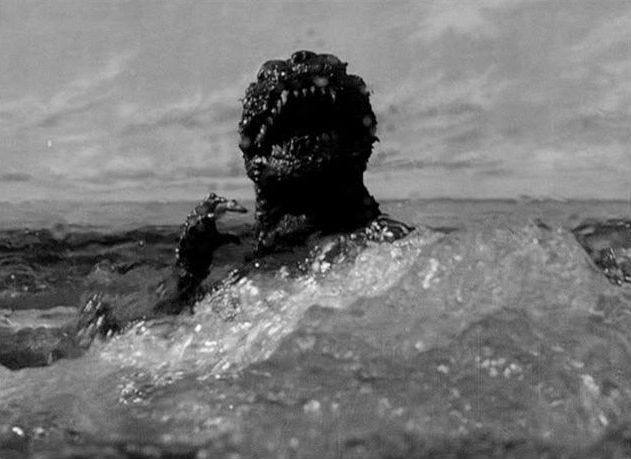Godzilla (1954)
Watched the original "Godzilla," from 1954. The greatest of all bad movies, an undeniable classic which is also a ludicrous, poorly-paced B-flick staffed by flat characters and a rubber monster suit. None of this matters. We need horror fiction to express the unsayable. This is why "Godzilla" works. You've read the poem about the rough beast slouching toward Bethlehem? Well, here he is. The consequences of the twentieth century on two legs.
"Godzilla" is not a campy monster mash, but a film about existential terror made nine years after Nagasaki. Do you really need to know the plot? Nuke testing wakes an ancient beast from the seas, and he marches on Tokyo in blind rage. Almost every human in the film is decent, and competent. Doesn't matter. The government valiantly tries to drive the monster back, time and again. It's not enough. They are simply up against something that can't be stopped. Vengeance is mine, saith the Lord, I will repay.
Does it matter that the suit is primitive, that the cars and buildings are cheap miniatures? No. In this movie, Godzilla is an unassailable dark ghost with dead doll eyes, a shambling Lovecraftian horror. There is nothing funny or lovable about him, not for one second. He has all the menace of sins being found out.
I recollect almost no dialogue: a blessing, since the script is insipid. What do I remember? The scene of the hospital creaking with the radiation-poisoned. The silent husk of burned Tokyo, echoing Nagasaki. The student choir singing in despair. A little girl crying over her mother's body. And, the most chilling moment: as the beast melts the city, a mother consoles her children: "Don't cry, we'll be with daddy soon."
Art exists to communicate difficult truths. I can easily sum up the message: "Godzilla" is about the evil of The Bomb, and the existential horror of humanity destroying itself. But that doesn't really communicate the weight of the issue, I think. Here's what does: in this movie, there's a shot where a doctor passes a Geiger counter over a little girl, and it goes berserk.
Let's go a little deeper still. The lizard wouldn't have lasted if he was a simple metaphor for Hiroshima--there's nothing new about dragon stories, after all. Godzilla could only have arisen in the twentieth century, the moment when humans began to fear that maybe we'd pushed too far too fast, done things we shouldn't have. He endures for the same reason we keep telling the Titanic story: he's a symbol of our capacity for hubris and Nature's capacity to push back, to overpower us no matter strong we think we are. He's the incarnation of the Bible story where the evil king Belshazzar sees the glowing warning on the wall: "You have been weighed, measured, and found wanting." Nature tolerates us. For now.





